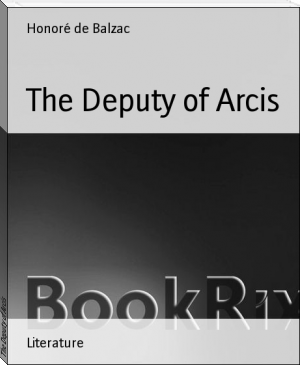The Deputy of Arcis - Honoré de Balzac (little red riding hood read aloud TXT) 📗

- Author: Honoré de Balzac
Book online «The Deputy of Arcis - Honoré de Balzac (little red riding hood read aloud TXT) 📗». Author Honoré de Balzac
The same day he mounted the tribune, and after speaking in general terms of the "bloody boobies" who by their foolish fury compromised the future of the Revolution, he told who and what Mother Marie-des-Anges really was; he dwelt on her marvellous aptitude for the training of youth, and he presented a scheme in which she was placed at the head of a "grand national gynaecium," the organization of which was to be made the subject of another decree. Robespierre, who would have thought the intellect of an Ursuline nun only a more imperative reason for bringing her under the revolutionary axe, was absent that day from the session, and the motion was voted with enthusiasm. The head of Mother Marie-des-Anges being indispensably necessary to the carrying out of this decree of the sovereign people, she kept it on her shoulders, and the headsman put aside his machine.
Though the other decree, organising the Grand National Gynaecium, was lost sight of in the many other duties that devolved upon the Convention, the excellent nun carried it out after her fashion. Instead of something grand and Greek and national, she started in Arcis a secular girl's-school, and as soon as a little quiet was restored to the minds of the community, pupils flocked in from all quarters. Under the Empire Mother Marie-des-Anges was able to reconstitute her Ursuline sisterhood, and the first act of her restored authority was a recognition of gratitude. She decreed that on every year on the 5th of April, the anniversary of Danton's death, a service should be held in the chapel of the convent for the repose of his soul. To those who objected to this edict she answered: "Do you know many for whom it is more necessary to implore God's mercy?"
Under the Restoration, the celebration of this service became a sort of scandal; but Mother Marie-des-Anges would never hear of suppressing it, and the great veneration which has always surrounded her obliged these cavillers to hold their tongues. This courageous obstinacy had its reward, under the government of July. To-day Mother Marie-des-Anges is high in court favor, and there is nothing she cannot obtain in the most august regions of power; but it is only just to add that she asks nothing,--not even for her charities, for she provides the means to do them nobly by the wise manner in which she administers the property of her convent.
Her gratitude, thus openly shown to the memory of the great revolutionist, has been of course to the revolutionary party a potent recommendation, but not the only one.
In Arcis the leader of the advanced Left is a rich miller named Laurent Goussard, who possesses two or three mills on the river Aube. This man, formerly a member of the revolutionary municipality of Arcis and the intimate friend of Danton, was the one who wrote to the latter telling him that the axe was suspended over the throat of the ex-superior of the Ursulines. This, however, did not prevent the worthy _sans-culotte_ from buying up the greater part of the convent property when it was sold under the name of national domain.
At the period when Mother Marie-des-Anges was authorized to reconstitute her community, Laurent Goussard, who had not made much by his purchase, went to see the good abbess, and proposed to her to buy back the former property of her convent. Very shrewd in business, Laurent Goussard, whose niece Mother Marie-des-Anges had educated gratuitously, seemed to pique himself on the great liberality of his offer, the terms of which were that the sisterhood should reimburse him the amount of his purchase-money. The dear man was not however making a bad bargain, for the difference in the value of assignats with which he had paid and the good sound money he would receive made a pretty profit. But Mother Marie-des-Anges, remembering that without his warning Danton could not have saved her, did better still for her first helper. At the time when Laurent Goussard made his offer the community of the Ursulines was, financially speaking, in an excellent position. Having since its restoration received many liberal gifts, it was also enriched by the savings of its superior, made from the proceeds of her secular school, which she generously made over to the common fund. Laurent Goussard must therefore have been thunderstruck when he read the following letter:--
Your proposal does not suit me. My conscience will not allow me to
buy property below its proper value. Before the Revolution the
property of our abbey was estimated at--[so much]. That is the
price I choose to give, and not that to which it has fallen since
the great depreciation of all property called national. In a word,
my friend, I wish to pay you more than you ask; let me know if
that suits you.
Laurent Goussard thought at first that either she had misunderstood him or he her. But when it became clear to him that owing to these pretended scruples of Mother Marie-des-Anges, he was the gainer of fifty thousand francs, he would not do violence to so tender a conscience, and he pocketed this profit (which came to him literally from heaven), but he went about relating everywhere the marvellous proceeding, which, as you can well imagine, put Mother Marie-des-Anges on a pinnacle of respect (especially from the holders of other national property) which leaves her nothing to fear from any future revolution. Personally Laurent Goussard has become her slave, her henchman. He does no business, he takes no step, he never moves a sack of flour without going to her for advice; and, as she said in joke the other day, if she took a fancy to make a John the Baptist of the sub-prefect, Laurent Goussard would bring her his head on a charger. That is proof enough that he will also bring his vote and that of his friends to any candidate she may favor.
Among the clergy Mother Marie-des-Anges has, naturally, many affiliations,--as much on account of her high reputation for goodness as for the habit of her order, but she particularly counts among the number of her most zealous servitors Monseigneur Troubert, bishop of the diocese, who, though formerly a familiar of the Congregation [see "The Vicar of Tours"], has nevertheless managed to secure from the dynasty of July an archbishopric which will lead to a cardinalship.
When you have the clergy you have, or you are very near having, the legitimist party with you,--a party which, while passionately desirous of free education and filled with hatred for the July throne, is not averse, when occasion offers, to yielding to a monstrous union with the radical party. Now the head of the legitimists in Arcis and its neighborhood is, of course, the family of Cinq-Cygne. Never does the old marquise, whose haughty nature and powerful will you, madame, know well [see "An Historical Mystery"],--never does she drive into Arcis from her chateau of Cinq-Cygne, without paying a visit to Mother Marie-des-Anges, who in former days educated her daughter Berthe, now the Duchesse Georges de Maufrigneuse.
But now we come to the most opposing and resisting side,--that of the conservatives, which must not be confounded with the party of the administration. Here we find as its leader the Comte de Gondreville, your husband's colleague in the Chamber of peers. Closely allied to the count is a very influential man, his old friend Grevin, formerly mayor and notary of Arcis, who, in turn, draws after him another elector of considerable influence, Maitre Achille Pigoult, to whom, on retiring from active life, he sold his practice as notary.
But Mother Marie-des-Anges has a powerful means of access to the Comte de Gondreville through his daughter, the Marechale de Carigliano. That great lady, who, as you know, has taken to devotion, goes into retreat every year at the Ursuline convent. More than that, the good Mother, without giving any explanation, intimates that she has a lever of some kind on the Comte de Gondreville known to herself only; in fact, the life of that old regicide--turned senator, then count of the Empire, then peer of France under two dynasties--has wormed itself through too many tortuous underground ways not to allow us to suppose the existence of secrets he might not care to have unmasked.
Now Gondreville is Grevin,--his confidant, and, as they say, his tool, his catspaw for the last fifty years. But even supposing that by an utter impossibility their close union should, under present circumstances, be sundered, we are certainly sure of Achille Pigoult, Grevin's successor, on whom, when the purchase of the chateau d'Arcis was made in his office by the Marquis de Sallenauve, a fee was bestowed of such an unusual amount that to accept it was virtually to pledge himself.
As for the ruck of the electors, our friend cannot fail to make recruits there, by the work he is about to give in repairing the chateau, which, fortunately for him, is falling into ruin in several places. We must also count on the manifesto which Charles de Sallenauve has just issued, in which he openly declares that he will accept neither favors nor employment from the government. So that, really, taking into consideration his own oratorical talent, the support of the Opposition journals both here and in Paris, the insults and calumnies which the ministerial journals are already beginning to fire upon him, I feel great hopes of his success.
Forgive me for presenting to you in glowing colors the parliamentary future of a man of whom, you said to me the other day, you felt you could not safely make a friend, because of the lofty and rather impertinent assumption of his personality. To tell the truth, madame, whatever political success may be in store for Charles de Sallenauve, I fear he may one day regret the calmer fame of which he was already assured in the world of art. But neither he nor I was born under an easy and accommodating star. Birth has been a costly thing to us; it is therefore doubly cruel not to like us. You have been kind to me because you fancy that a lingering fragrance of our dear Louise still clings to me; give something, I beseech you, of the same kindness to him whom I have not hesitated in this letter to call our friend.
XV. MARIE-GASTON TO THE COMTESSE DE L'ESTORADE
Arcis-sur-Aube, May 13, 1839.
Madame,--I see that the electoral fever is upon you, as you are good enough to send me from Monsieur de l'Estorade so many _discouragements_ which certainly deserve consideration.
We knew already of the mission given to Comte Maxime de Trailles,--a mission he endeavored at first to conceal under some irrigating project. We even know what you, madame, seem not to know,--that this able ministerial agent has found means to combine with the cares of electoral politics those of his own private policy. Monsieur Maxime de Trailles, if we are rightly informed, was on the point of succumbing to the chronic malady with which he has been so long afflicted; I mean _debt_. Not debts, for we say "the debt of Monsieur de Trailles," as we say "the debt of England." In this extremity the patient, resolved on heroic remedies, adopted that of marriage, which might perhaps be called marriage _in extremis_.
To cut a long story short, Monsieur de Trailles was sent to Arcis to put an end to the candidacy of an upstart of the Left centre, a certain Simon Giguet; and having brought forward the mayor of the town as





Comments (0)